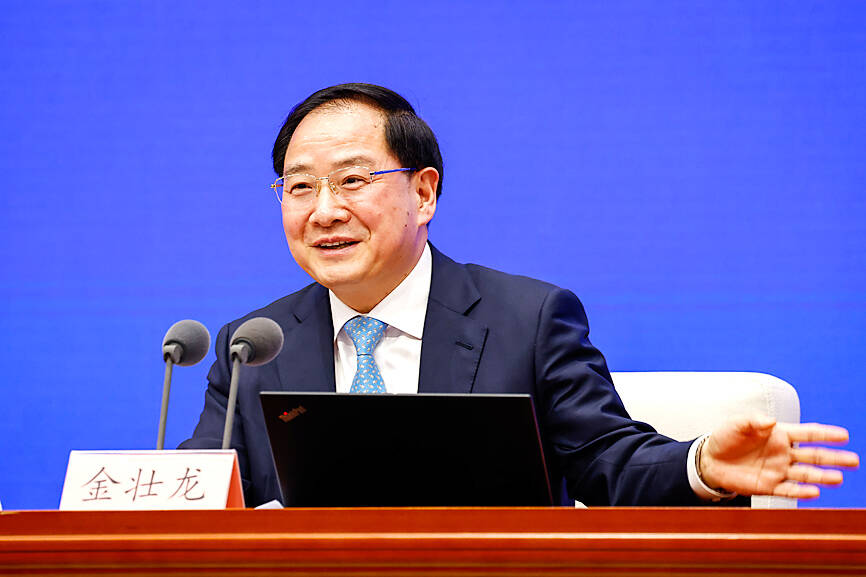China has assigned a new head to a high-profile, state-backed chip investment fund amid a renewed push to pour resources into the local semiconductor industry and counter a US-led blockade of the country’s technological development.
Zhang Xin (張新) is to become president of the National Integrated Circuit Industry Investment Fund Co (國家集成電路投資基金), popularly known as the Big Fund, Chinese corporate data service provider Tianyancha (天眼查) said.
Zhang was previously a mid-ranking official from the Chinese Ministry of Industry and Information Technology, Chinese news outlet Caixin said.

Photo: EPA-EFE
The Big Fund was tarnished by an anti-graft probe last year, which led to the downfall of its previous chief and several other officials.
Top Chinese leaders ordered investigations after they grew frustrated with a lack of breakthrough in developing semiconductors to replace foreign imports after years of ample government investments, at a time when the US and its allies are tightening restrictions on China’s access to critical technologies.
The secretive Big Fund is Beijing’s primary vehicle for doling out capital to the country’s chipmakers. Founded in 2014, it drew about US$45 billion in capital and backed scores of companies, including Semiconductor Manufacturing International Corp (中芯國際) and Yangtze Memory Technologies Co (長江存儲).
The fund operated mostly behind the scenes and kept investment standards away from public view, which some analysts said undercut accountability.
Zhang replaced Ding Wenwu (丁文武) as the fund’s president on Friday, and a day later replaced him as the head of China Integrated Circuit Industry Investment Fund Phase II Co (中國集成電路產業投資基金二期), another state-backed chip fund, Tianyancha said.
Zhang is listed as a first-class technology inspector on the Web site of the technology ministry’s planning bureau, while Ding was once director of the ministry’s electronic information bureau, outranking Zhang.
The Big Fund became somewhat dormant for a few months following the anti-graft investigations, but it sprang back into action earlier this year, pledging an additional investment into Yangtze Memory, China’s top memorychip maker, which has been blacklisted by the US.

NEW IDENTITY: Known for its software, India has expanded into hardware, with its semiconductor industry growing from US$38bn in 2023 to US$45bn to US$50bn India on Saturday inaugurated its first semiconductor assembly and test facility, a milestone in the government’s push to reduce dependence on foreign chipmakers and stake a claim in a sector dominated by China. Indian Prime Minister Narendra Modi opened US firm Micron Technology Inc’s semiconductor assembly, test and packaging unit in his home state of Gujarat, hailing the “dawn of a new era” for India’s technology ambitions. “When young Indians look back in the future, they will see this decade as the turning point in our tech future,” Modi told the event, which was broadcast on his YouTube channel. The plant would convert

‘SEISMIC SHIFT’: The researcher forecast there would be about 1.1 billion mobile shipments this year, down from 1.26 billion the prior year and erasing years of gains The global smartphone market is expected to contract 12.9 percent this year due to the unprecedented memorychip shortage, marking “a crisis like no other,” researcher International Data Corp (IDC) said. The new forecast, a dramatic revision down from earlier estimates, gives the latest accounting of the ongoing memory crunch that is affecting every corner of the electronics industry. The demand for advanced memory to power artificial intelligence (AI) tasks has drained global supply until well into next year and jeopardizes the business model of many smartphone makers. IDC forecast about 1.1 billion mobile shipments this year, down from 1.26 billion the prior

People stand in a Pokemon store in Tokyo on Thursday. One of the world highest-grossing franchises is celebrated its 30th anniversary yesterday.

Zimbabwe’s ban on raw lithium exports is forcing Chinese miners to rethink their strategy, speeding up plans to process the metal locally instead of shipping it to China’s vast rechargeable battery industry. The country is Africa’s largest lithium producer and has one of the world’s largest reserves, according to the US Geological Survey (USGS). Zimbabwe already banned the export of lithium ore in 2022 and last year announced it would halt exports of lithium concentrates from January next year. However, on Wednesday it imposed the ban with immediate effect, leaving unclear what the lithium mining sector would do in the